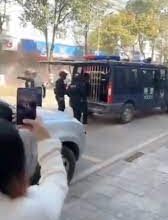Rafah prepares for an Israeli attack as Hamas travels to Cairo for peace negotiations
Gaza Strip (Palestinian Territories): As fleeing Gazans prepared for an anticipated Israeli attack on their last haven of Rafah, negotiations to halt the Israel-Hamas conflict and release the remaining captives entered their second day in Cairo on Wednesday.

Following Tuesday’s negotiations between Israeli negotiators and the mediators, a team from Hamas informed AFP that it was traveling to the Egyptian capital to meet with Egyptian and Qatari mediators.
Recep Tayyip Erdogan, the president of Turkey and a vocal opponent of Israel’s handling of the Gaza conflict, was scheduled to meet President Abdel Fattah al-Sisi in Cairo on Wednesday.
CIA Director William Burns participated in Tuesday’s mostly “positive” meetings with Israel’s Mossad chief intelligence officer, David Barnea, according to Egyptian media.
The conversations were characterized as “constructive and moving in the right direction” by John Kirby, a spokesman for the US National Security Council.
Before Israel launches a full-scale ground invasion into the far-southern Gaza Strip city of Rafah, where more than 1.4 million Palestinians are confined, mediators are working quickly to achieve a stop to the combat.
There have been frantic pleas for Israel to refrain from deploying soldiers into the last large population center they have not yet entered during the four-month conflict, even from close friends, due to the possibility of massive civilian losses.
The United States, a crucial ally, has said that without a “credible plan” to protect civilians, it would not support any ground action in Rafah.
In the event that an attack proceeds, UN organizations have warned of a humanitarian catastrophe as Rafah serves as the primary entry route for badly needed relief supplies.
As said by UN humanitarian head Martin Griffiths, “a slaughter could result from any military operation.”
People in terror have been forced to flee in a frantic attempt to find refuge.
“My three children were injured, where can I go?” At the city’s border crossing with Egypt, Dana Abu Chaaban begged, expecting to be let through with her bandaged boys.
“Let’s cross.”
As hundreds of thousands of Palestinian citizens have sought refuge in improvised camps along the border, where they are facing epidemics of hepatitis and diarrhea as well as a shortage of food and water, pressure on Egypt to open its border to them has intensified.
But Gazans are still unable to enter.
“For 100 days we enter the crossing and beg them to let us cross, or to do anything to help us,” Habiba Nakhala said.
“Needing to be protected” is how US President Joe Biden described the “exposed and vulnerable” population in Rafah.
However, “complete victory” cannot be attained, according to Israeli Prime Minister Benjamin Netanyahu, until Hamas’s last battalions in Rafah are destroyed.
The Israeli military is continuing to attack Gaza as the cease-fire negotiations are taking place in Cairo. On Wednesday, the Hamas-run territory’s health ministry said that 104 individuals had died during the course of the previous night.
Days after the October 7 bombing that started the war, Yahya Sinwar, the leader of Hamas in Gaza, and his family were seen fleeing down a tunnel in a video that the IDF published late on Tuesday. The footage purportedly originated from a surveillance camera.
The Israeli army spokeswoman, Daniel Hagari, told reporters, “The hunt will not stop until he is captured alive or dead.”
While some Gazans in Rafah were preparing to relocate by packing their possessions, others swore to remain put out of dread of even worse suffering in their destroyed hometowns.
Ahlam Abu Assi said that she “would rather die” in Rafah rather than go back to the circumstances akin to starvation that her family in Gaza City were enduring.
“My son has no food, and neither do his kids. They boil a little amount of rice and save it for later, the source told AFP. “My grandson cries from hunger.”
Prisoners
Around 1,160 persons in Israel lost their lives as a consequence of the Hamas strike that started the conflict, the majority of them were civilians, according to an AFP count based on Israeli government statistics.
The health ministry reports that Israel’s reaction has resulted in the deaths of at least 28,473 persons, the most of them women and children.
It is thought that around 130 of the 250 persons who were kidnapped by Palestinian terrorists during the assault are still in Gaza. According to Israel, 29 are thought to be dead.
When reporters questioned National Security Council spokesman Kirby about his belief that there were still Americans among the captives, Kirby said, “We don’t have any information to the contrary.”







